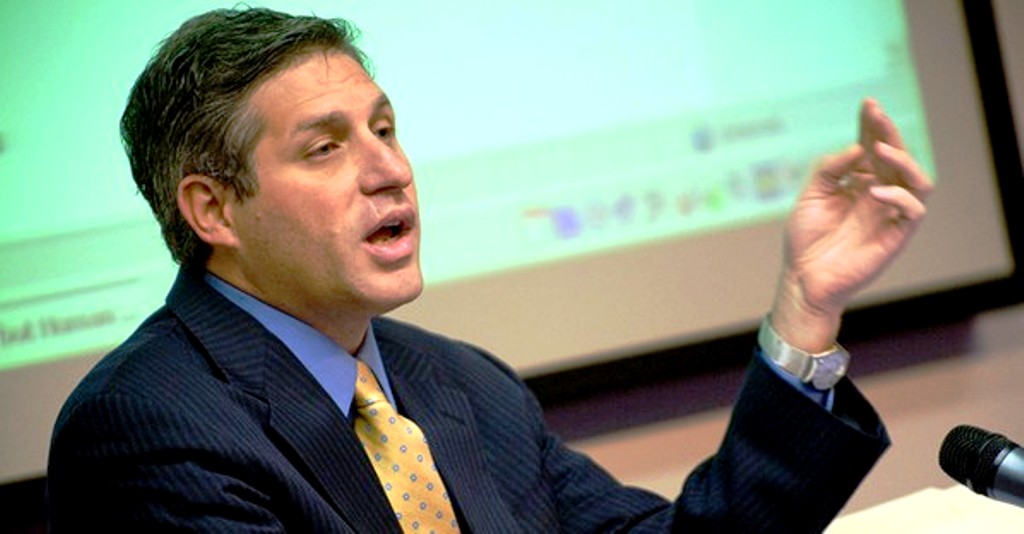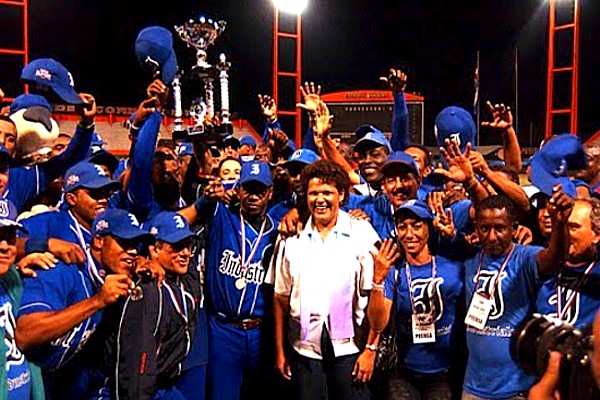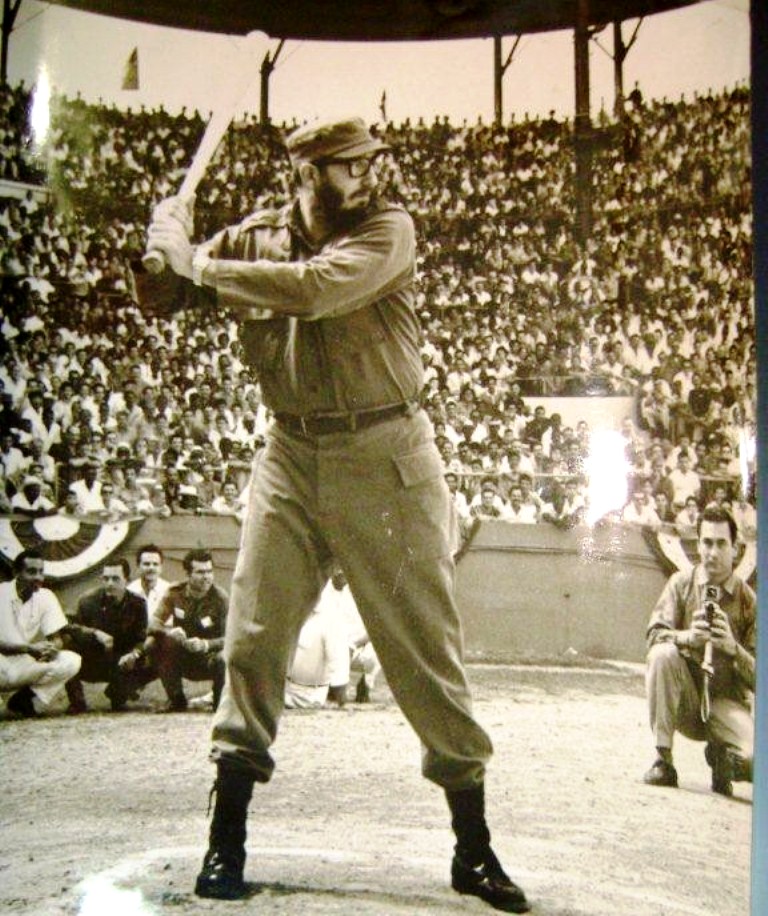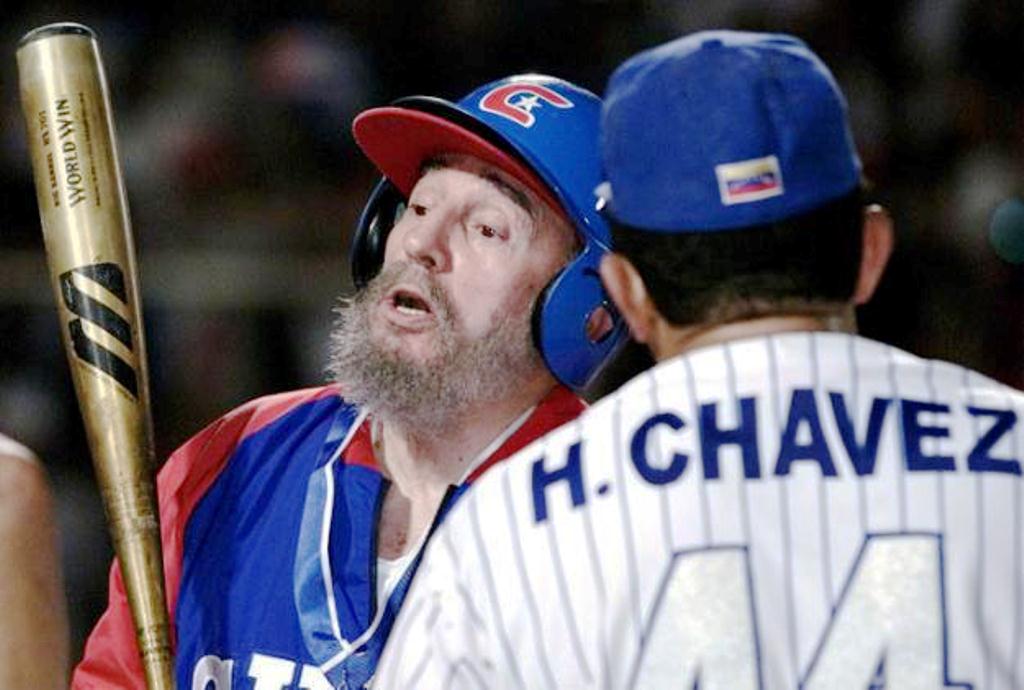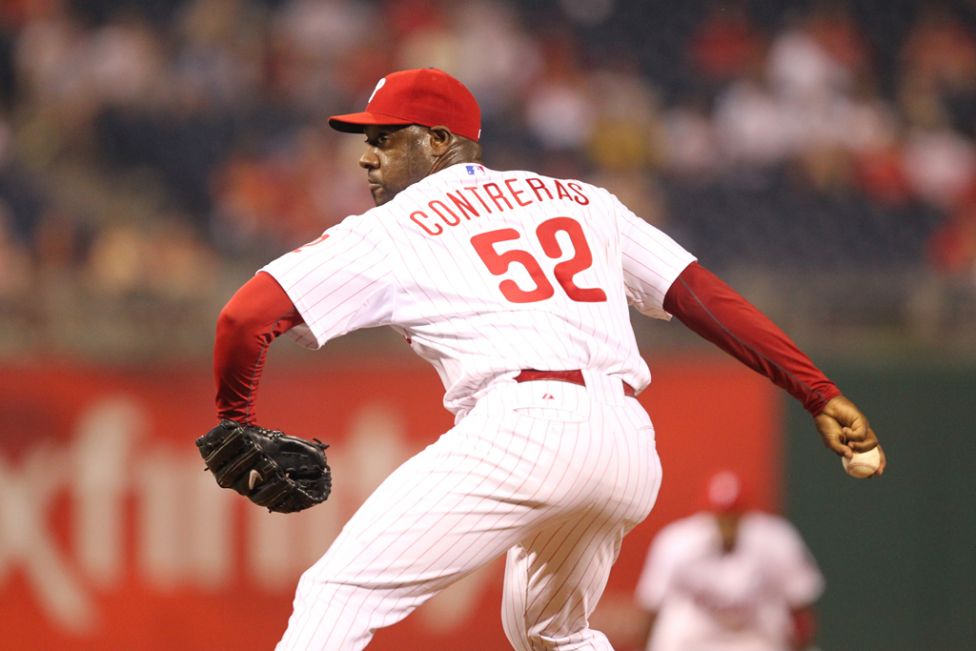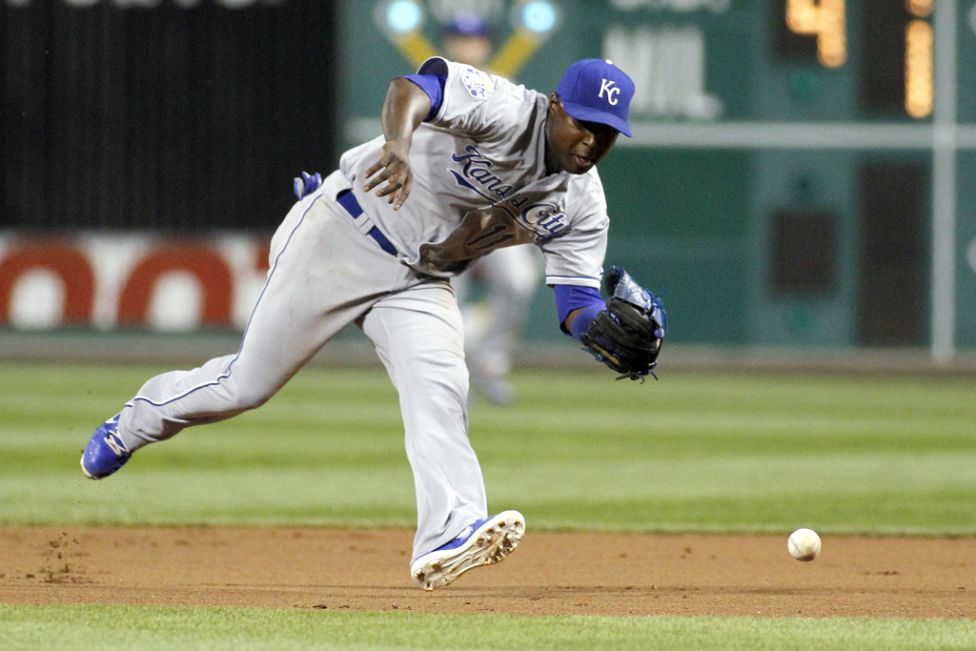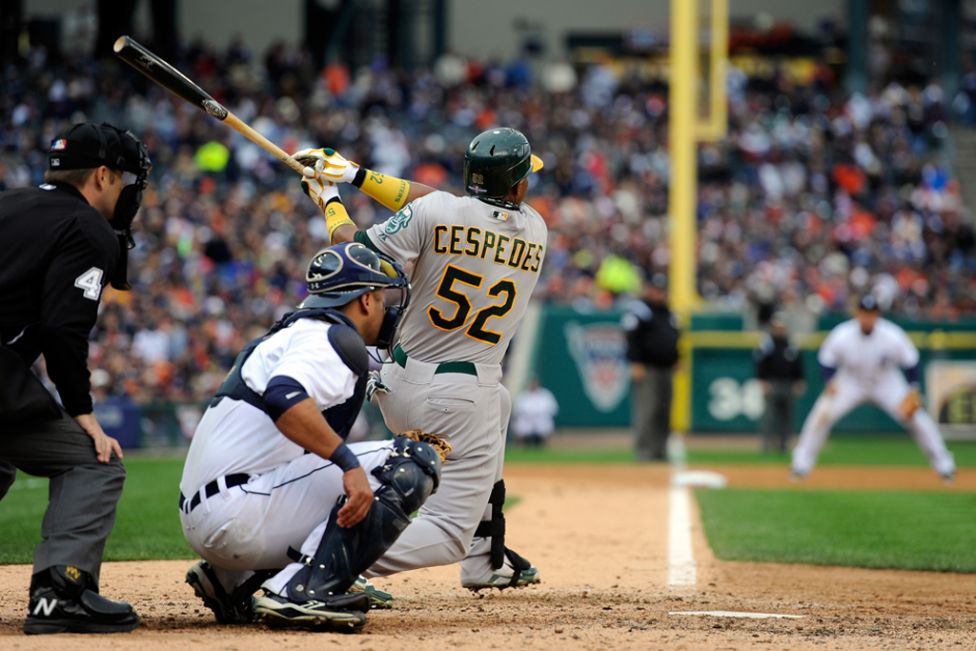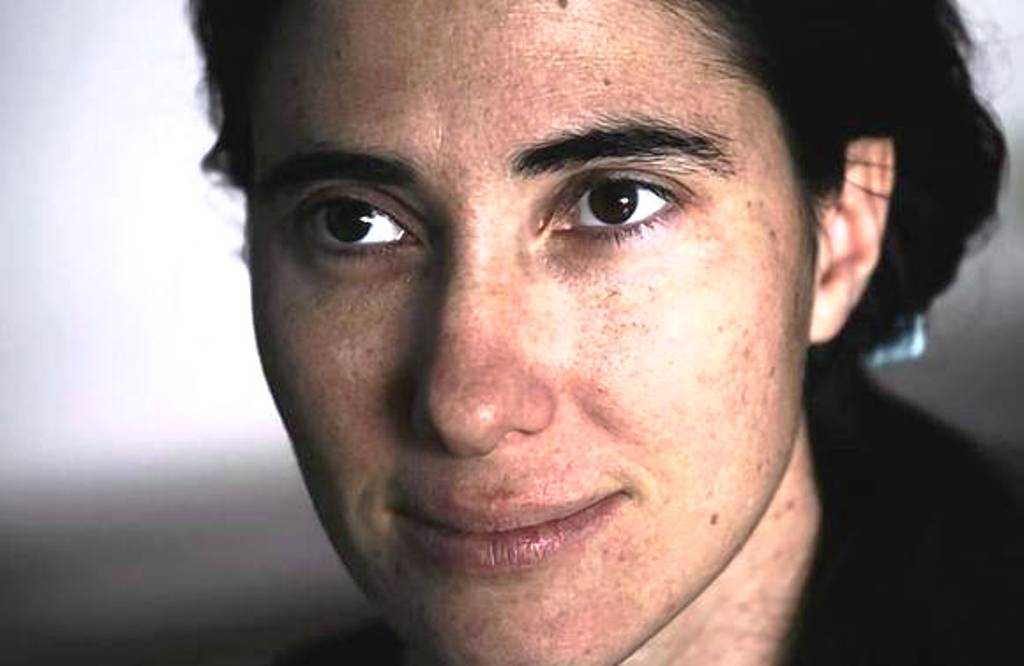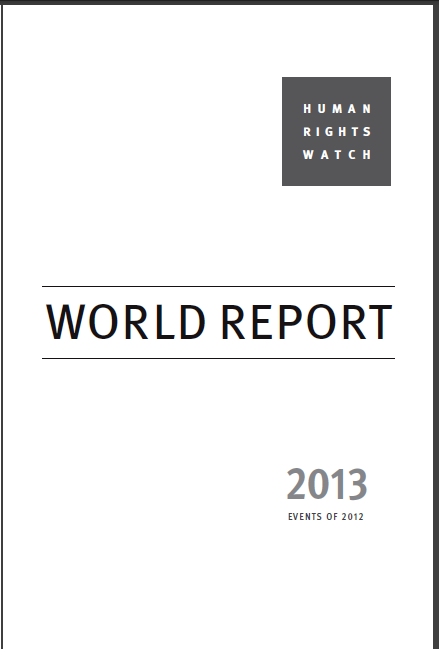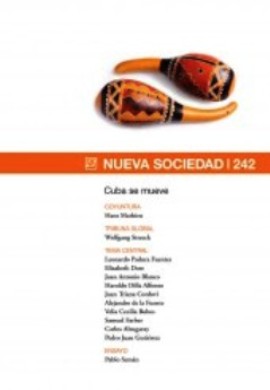No Country MAGAZINE, 03/23/2021
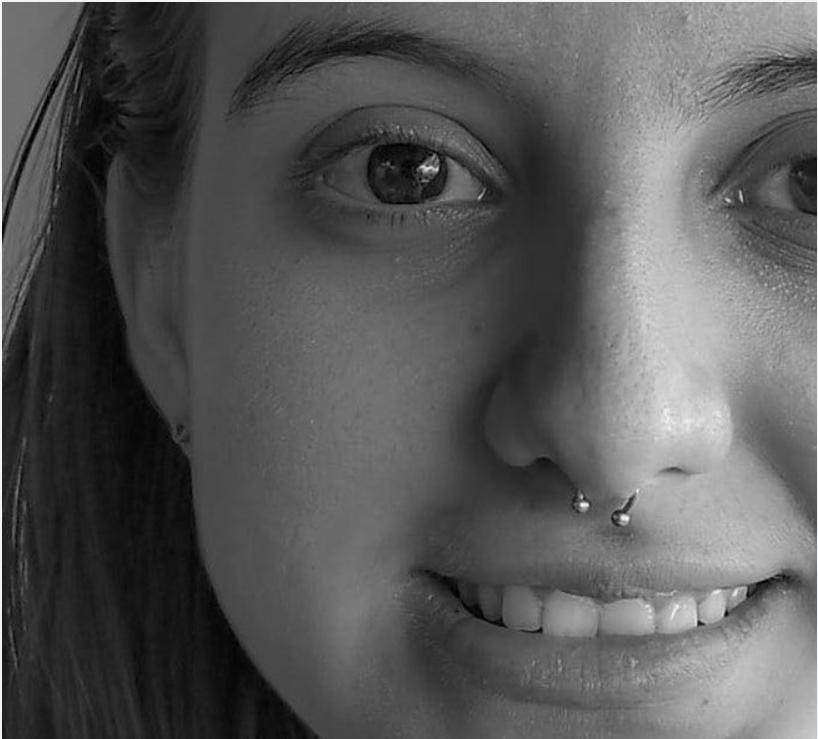
Karla Pérez
Karla Pérez (Cienfuegos, 1998), the young Cuban woman whom the Cuban government prohibited from returning to her country yesterday, March 18, is 22 years old. She graduated with a degree in Journalism in December 2020 from the Universidad Latina de Costa Rica.
The prohibition of her return to the country where she was born in 1998 occurs almost exactly four years after she was expelled for political reasons from the Journalism program of the Universidad Central “Marta Abreu” de Las Villas (UCLV) on April 13, 2017.
According to a detailed report from the Observatorio de Libertad Académica in November 2020, a few months before entering UCLV, when Pérez was still only 17 years old, she joined the political movement Somos +, an organization established in 2013 with the objective of “building a modern, prosperous and free country.”
This dissident initiative has been both disqualified and persecuted by the Cuban government, which classifies it as a subversive and counterrevolutionary project financed by the United States.
According to Pérez, at that time she was attracted to Somos + because: “There were many good people there, people that I considered an example to follow. In the beginning, that movement was like a mirror of the country that I wanted.”
As a consequence of her membership in Somos + and as punishment for expressing herself openly on the group’s blog, she was accused of having violated university regulations and expelled on the morning of April 13 by a group of “decision makers” from the university, made up of four journalism professors and six members of the University administration.
More shocking is the fact that a brigade of FEU (University Student Federation) members from Pérez’s own cohort, that is, the 14 other students who were studying journalism with her, also signed onto her expulsion. All of them had already been informed that anyone who opposed her punishment would themselves be “analyzed” at a later date.
Seeing all the channels for a professional future closed to her on the Island, Pérez accepted the offer of assistance from the staff of the Costa Rican newspaper El Mundo and was able to continue and eventually finish her Journalism studies in that country between 2016 and 2020. At the same time, she actively devoted herself to the practice of independent journalism, collaborating with Diario de Cuba and Havana Times in 2017 and serving as a “community manager” and correspondent at Tremenda Nota starting in 2018. She currently works with the magazine ADN Cuba.
As part of a larger project that I am currently undertaking that traces the career paths of independent Cuban journalists, I interviewed Pérez on March 15, three days prior to the Orwellian migration ordeal she is currently experiencing. The interview tries to capture the process of “conscientization” of a young Cuban woman attracted to the profession of Journalism in a country like Cuba. Furthermore, it reveals in gripping detail the many personal, family, and political costs that one must pay when embarking on the tortuous path of free expression in Cuba.
Ted A. Henken: How and why did you decide to study Journalism in college? What attracted you to the idea of being a journalist in a country like Cuba?
Ted A. Henken: How and why did you decide to study Journalism in college? What attracted you to the idea of being a journalist in a country like Cuba?
Karla Pérez: It is not a very romantic response at the beginning. I had always had an affinity for language and literature since elementary school. History, Spanish, and literature all fascinated me. The “romantic” came later, in high school. I managed to have more access to an alternative civil society, to find out what was happening in Havana and the “Oriente”, and also to become irritated because I could not read about these things in the state press.
My nuclear family and I had broken with the Cuban government a long time ago and I had long since decided that I would never work in the official press. I wanted to write about what was being marginalized from the “revolutionary” discourse and I knew that I couldn’t do it in the permitted newspapers.
Could you describe your family and social origins?
I come from a nuclear family (my father, mother, and me) of professionals. My father is a civil engineer and my mother is an economist. However, shortly after graduating, they began working in the private sector due to the poor conditions provided by the state sector. For my parents, there was never a break with the Revolution, because they simply never believed in it.
My grandparents, as is quite common in the Cuban family, are people integrated into the revolutionary process, and I wouldn’t want to go much beyond that out of respect for their privacy.
In my childhood and adolescence, I focused on going to school and getting good grades. I was already beginning to develop a critical capacity of my own, but apart from a few controversies with teachers in middle and high-school, it did not go beyond that. I was never a member of the UJC (Young Communist League) or the FEU, for example. In college, I was also like that; I never used the university as a platform to criticize the government. I did that on the outside (through the Somos + blog and in my on-line social networks).
What was your first job as a journalist in the state sector?
I never worked in state newspapers, although I did do an internship for a month, during my first semester of college between January and February of 2017. The provincial newspaper 5 de septiembre allowed me a lot of leeway within the “professional Calvary” that working in the official media represented. They did not impose the topics I should write about and I was able to focus on giving a voice to actors in the private sector who were then emerging in the city (business owners and bicycle taxi drivers). There was one time where I was directly censored when the then director of the newspaper, Adonis Subit Lamí, called me into his office to ask me to “correct” certain phrases of an interview.
I cannot share any articles from that time with you because they have since been deleted from the newspaper’s website. Just now, I went back to look for them and they do not appear. However, in essence I interviewed an engineer who earned his living as a rickshaw driver, because working in his profession paid little and the owners of a private cafe known as “La Buena Pipa”; among other jobs that I don’t remember very well now.
Regarding the censorship of Adonis Subit Lamí, I remember that it was in the interview with the rickshaw driver and focused on a passage that quoted him as saying: “there is lack of freedom to do things[…]”. This was related to private sector work in Cuba. The official told me that using the word “freedom” was too strong in that context and that I should change it.
Why did you decide to leave the state media and become an independent journalist?
Already ever since I was a student working toward my degree, I wanted to work in the emerging alternative, independent media sector. I had been watching the appearance of new outlets like El Estornudo and Periodismo de Barrio.
How did you discover these two independent media start-ups and how were you able to access their content during these years?
Through the internet and through friendships that I had been building through Facebook, which I have been on since 2011. Also, remember that earlier the “weekly package” used to include content from dissidents, activists, and independent journalists, especially as part of programs produced in South Florida. That’s how I discovered figures like Yoani Sánchez and Eliecer Ávila. Now, however, this kind of content is systematically eliminated from the “package” by its distributors.
For me, it was just the dream of being part of the independent media, not actually putting it into practice, that led to my definitive expulsion from the world of higher education in Cuba.
That triggered my forced exile in order to complete my university studies. At the same time, I have been separated from my family for almost four years now (2017-2021). During that time outside of Cuba, I have also done independent journalism based as I am in a solid democracy like Costa Rica and have suffered no retaliation because of it.
Why do you say “forced exile”?
Well, it seems enough to me to qualify as “forced exile”, based on my expulsion at the age of 18 from the university and the entire system of higher education in Cuba. At that age what you do is study, right? What was left for me in a country where I could not continue to achieve my academic goals?
What were the costs and benefits of your decision to practice independent journalism?
It’s bad enough that haven’t been able to see my parents, sister, and other relatives for four years. Perhaps the greatest benefit has been to have a clear conscience for having fulfilled my duty and feeling that I have served a useful purpose for Cuba, reflecting that part of reality that never appears in the official media. And that is a big part of what makes up Cuba.
What is it that fundamentally differentiates independent journalism from official journalism?
The essential difference is that independent journalism covers more of Cuban reality; it covers a much wider spectrum of how life actually goes on in Cuba. Meanwhile, the official media looks the other way when it comes to poverty, the repression of dissent, and vulnerable communities.
It is an automated operation and anyone who has tried to push the limits suffers the consequences. Plus, the salaries for official journalists are among the lowest in the state sector, pushing its practitioners into precariousness.
You are a journalist, but doing journalism outside the official media in Cuba turns you into a kind of “dissident” in the eyes of the state, even when that is not your aim. Right? For you, what is the key difference between being an independent journalist and a dissident? Is it possible to be both at the same time?
I think that in a totalitarian state like Cuba, I am both: a journalist and also a dissident; I “dissent” from the established order because it affects me directly both on a personal and professional level. So, I am not interested in distancing myself from one thing or the other. Still, of course, I have established limits in my coverage of dissidents, organizations, and movements. I am not an active member of those groups, but I do advocate for causes that I consider just.
And even if a democracy were founded on the island tomorrow, I would always work to hold the government and its leaders to account. I would continue being a “dissident” vis-à-vis policies that seem wrong or arbitrary to me. Injustice is not automatically eliminated with the arrival of democracy.
For a time, some blogs and then later independent media outlets emphasized the fact that they were produced “from Cuba,” in contrast to others that were produced “from abroad.” For you, does this distinction still have importance, significance, or relevance given the increasingly “transnational” reality of both journalism and the Cuban nation itself?
To advance in our common goals, the inside and outside should no longer be thought of as separate settings.
Although, of course, I consider the people who do journalism from within the island of greater value based on their resistance, and I never would, from my position of privilege, minimize them or try to tell them what to do.
In the end, I think we complement one another very well. Exiled professionals have always pushed those who fight, in this case journalists, from within totalitarian regimes.
In all parts of the world, the model of media financing is in crisis. In Cuba, there is also an official discourse that argues that the independent journalists and media are actually “subversives” or “mercenaries” because they have developed alternative financing. How do you navigate in this extremely polarized and politicized context?
The key in my work is that there is no imposition of agendas, editorial lines, or approaches that betray my values and what I believe is fair. Everything can be discussed in the newsrooms. There must be openness, of course, but there are basic principles that are non-negotiable. This is a conversation that we have (and must have) within our media outlets.
The defamations and slanders that are showered down from Cuban officialdom no longer affect us. What concerns me is clarity within myself and with my nuclear family.
What are your experiences of harassment, intimidation, or detention and interrogation by state security? Has your free movement been prevented or “regulated” within or outside the country?
I was interrogated three times (between September 2016 and January 2017) when I was 18 years old when I was a Journalism student at the Universidad Central “Marta Abreu” de Las Villas (UCLV).
What were the reasons behind these interrogations?
My posts and denunciations on social networks; my collaboration on the blog of the Somos + Movement; my relationship with figures like Eliecer Ávila and Iliana Hernández; my absence from political-indoctrination events at the University, such as those that occurred with the death of Fidel Castro. Later in April 2017, I was expelled from UCLV and permanently from the entire system of higher education in Cuba.
I have seen the document that was given to you justifying your expulsion. Are there other similar cases of students or professors who have been expelled from Cuba’s Journalism schools for ideological reasons?
I personally know of the case of a professor from my own University (UCLV), Dalila Rodríguez, a Master of Linguistic and Editorial Studies, who was expelled just weeks after I was. She did not belong to any opposition movement, but the repression occurred because she was the daughter of a religious leader, Leonardo Rodríguez, an opposition leader associated with the Instituto Patmos.
Ted A. Henken (Pensacola, 1971) is an associate professor of sociology at Baruch College, CUNY. His most recent academic works include Cuba’s Digital Revolution: Citizen Innovation and State Policy (University of Florida Press, 2021) and Cuba empresarial: emprendedores ante una cambiante política pública (Editorial Hypermedia, 2020). He is currently working on a history of independent journalism in Cuba.


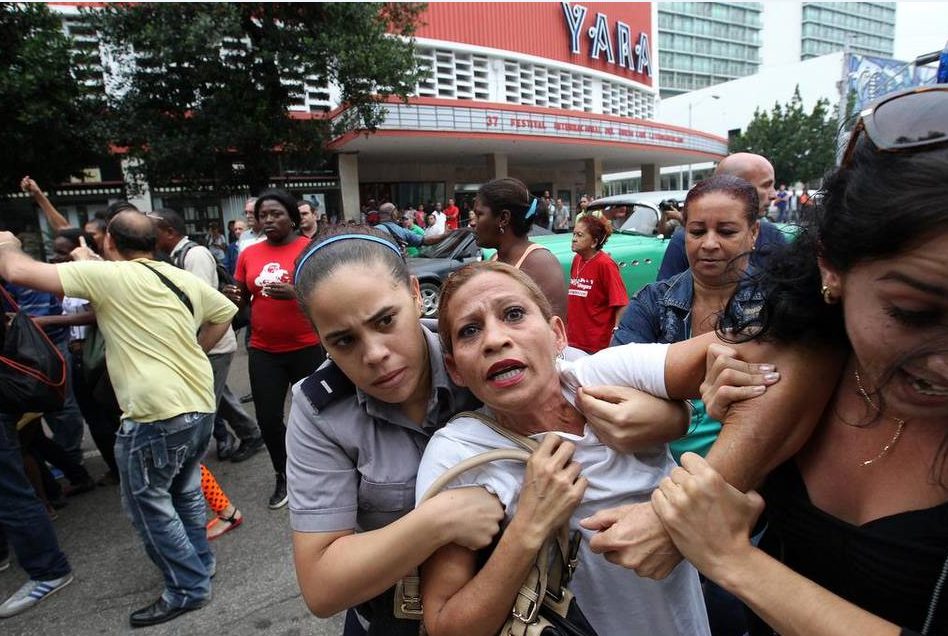 Cuban security personnel detain a member of the Ladies in White group after their weekly anti-government protest march, in Havana, on September 13, 2015. Human Rights Watch, World Report: Cuba 2016
Cuban security personnel detain a member of the Ladies in White group after their weekly anti-government protest march, in Havana, on September 13, 2015. Human Rights Watch, World Report: Cuba 2016